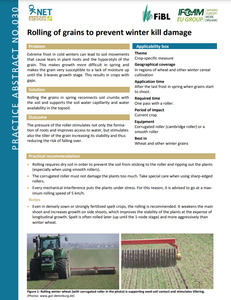{Tool} Rolling of grains to prevent winter kill damage (OK-Net Arable Practice Abstract). [Getreide gegen Auswinterungsschäden walzen.] Creator(s): Dierauer, Hansueli; Siegrist, Franziska and Weidmann, Gilles. Issuing Organisation(s): FiBL - Research Institute of Organic Agriculture. OK-Net Arable Practice abstract, no. 030. (2017)
Preview |
PDF
- German/Deutsch
(Getreide gegen Auswinterungsschäden walzen)
461kB |
Preview |
PDF
- English
(Rolling of grains to prevent winter kill damage)
358kB |
![[thumbnail of 2023-01-09 14_42_03-Rolling of grains to prevent winter kill damage.png]](/31034/26.hassmallThumbnailVersion/2023-01-09%2014_42_03-Rolling%20of%20grains%20to%20prevent%20winter%20kill%20damage.png)  Preview |
Image (PNG)
- Cover Image
- English
256kB |
Document available online at: https://orgprints.org/31034/
Summary in the original language of the document
The pressure of the roller stimulates not only the formation of roots and improves access to water, but stimulates also the tiller of the grain increasing its stability and thus reducing the risk of falling over.
Practical recommendation
• Rolling requires dry soil in order to prevent the soil from sticking to the roller and ripping out the plants (especially when using smooth rollers).
• The corrugated roller must not damage the plants too much. Take special care when using sharp-edged rollers.
• Every mechanical interference puts the plants under stress. For this reason, it is advised to go at a maximum rolling speed of 5 km/h.
Notes
• Even in densely sown or strongly fertilized spelt crops, the rolling is recommended. It weakens the main shoot and increases growth on side shoots, which improves the stability of the plants at the expense of longitudinal growth. Spelt is often rolled later (up until the 1-node stage) and more aggressively than winter wheat.
Summary translation
Der Druck der Walze regt neben der Wurzelbildung und der Wasserversorgung auch die Bestockung des Getreides an und fördert dessen Standfestigkeit, was das Lagerungsrisiko reduziert.
Vorgehen
• Das Walzen erfordert einen trockenen Boden, um zu vermeiden, dass die Erde an der Walze kleben bleibt und die Getreidepflanzen ausgerissen werden (besonders wichtig bei Glattwalzen).
• Die Rauwalze darf die Getreidepflanzen nicht zu stark schädigen. Besondere Vorsicht ist bei scharfkantigen Rauwalzen geboten.
• Jeder mechanische Eingriff stresst die Kulturpflanzen; deshalb das Getreide mit einer Geschwindigkeit von maximal zirka 5 km/ Std. walzen.
Hinweise
• Auch in dicht gesäten oder stark gedüngten Dinkelbeständen ist das Walzen empfehlenswert. Es schwächt den Haupttrieb und fördert das Wachstum der Nebentriebe, was die Standfestigkeit der
Pflanzen auf Kosten des Längenwachstums verbessert. Dinkel wird oft etwas später (bis ins 1-Knotenstadium) und aggressiver gewalzt als Winterweizen.
| EPrint Type: | Practice tool |
|---|---|
| What problem does the tool address?: | Extreme frost in cold winters can lead to soil movements that cause tears in plant roots and the hypocotyls of the grain. This makes growth more difficult in spring and makes the grain very susceptible to a lack of moisture up until the 3-leaves growth stage. This results in crops with gaps. |
| What solution does the tool offer?: | Rolling the grains in spring reconnects soil crumbs with the soil and supports the soil water capillarity and water availability in the topsoil. |
| Country: | Switzerland |
| Type of Practice Tool: | Practice abstracts |
| Theme: | Crop specific |
| Keywords: | arable farming, crop cultivation, crop species, soil cultivation |
| Keywords: | arable farming, crop cultivation, crop species, soil cultivation |
| Agrovoc keywords: | Language Value URI English arable farming http://aims.fao.org/aos/agrovoc/c_36528 English crop production http://aims.fao.org/aos/agrovoc/c_5976 English crops http://aims.fao.org/aos/agrovoc/c_1972 English tillage http://aims.fao.org/aos/agrovoc/c_7771 English cropping systems http://aims.fao.org/aos/agrovoc/c_1971 |
| Subjects: | Crop husbandry > Production systems Crop husbandry > Production systems > Cereals, pulses and oilseeds Crop husbandry > Soil tillage Crop husbandry > Crop health, quality, protection |
| Research affiliation: | European Union > Horizon 2020 > OK-Net Arable > OK-Net-Arable Tools Switzerland > FiBL - Research Institute of Organic Agriculture Switzerland > Knowledge exchange > Advice European Union > Horizon 2020 > OK-Net Arable European Union > Organic Farm Knowledge |
| Horizon Europe or H2020 Grant Agreement Number: | 652654 |
| Related Links: | https://organic-farmknowledge.org/tool/31034 |
| Project ID: | ofk |
| Deposited By: | Forschungsinstitut für biologischen Landbau, FiBL |
| ID Code: | 31034 |
| Deposited On: | 18 Jan 2017 14:34 |
| Last Modified: | 02 May 2024 10:31 |
| Document Language: | English, German/Deutsch |
| Status: | Published |
Repository Staff Only: item control page

 Download Statistics
Download Statistics Download Statistics
Download Statistics
